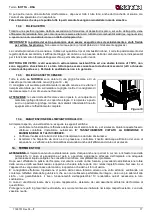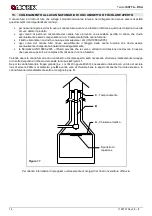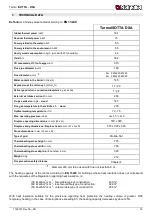
Termo
ISOTTA – DSA
24
7199701 Rev.05 – EN
4.1 FIRST-AID MEASURES
Should any fire arise in the stack or in the flue:
a) Close the feeding door and the ash drawer door;
b) Close the controls of combustion air;
c) Extinguish the fire using carbon dioxide fire-fighting means (CO
2
dust);
d) Seek immediate intervention of FIRE BRIGADE.
DO NOT EXTINGUISH FIRE USING WATER JETS.
When the fire has been extinguished, let the flue check by an expert to find possible cracks and permeable points.
5.
FLUE
Essential requirements for a correct operation of the appliance:
•
the internal section must be preferably circular;
•
be thermally insulated and water-proof and produced with materials suitable to resist to heat, combustion
products and possible condensates;
•
not be throttled and show a vertical arrangement with deviations not greater than 45°;
•
if already used, it must be clean;
•
observe the technical data of the instructions manual;
Should the flues have a square or rectangular section, internal edges must be rounded with a radius not lower than 20
mm. For the rectangular section, the maximum ratio between the sides must be
≤
1.5.
A too small section causes a decrease of the draught. It is suggested a minimum height of 4 m.
The following features are forbidden and therefore they endanger the good operation of the appliance: asbestos
cement, galvanized steel, rough and porous internal surfaces. Picture 5 gives some examples of execution.
The minimum section must be 4 dm
2
(for example 20 x 20 cm) for appliances whose duct diameter is lower
than 200 mm, or 6.25 dm
2
(for example 25 x 25 cm) for appliances with diameter greater than 200 mm.
The draught created by the flue must be sufficient, but not excessive.
A too big flue section can feature a too big volume to be heated and consequently cause difficulties in the operation of
the appliance; to avoid this, tube the flue along its whole height. A too small section causes a decrease of the draught.
The flue must be properly spaced from any flammable materials or fuels through a proper insulation or an air
cavity.
It is forbidden to let plant piping or air feeding channels pass in the same flue. Moreover, it is forbidden to create
movable or fixed openings on the same for the connection of further other appliances.
5.1 CHIMNEY CAP
The draught of the flue depends also on the suitability of the chimney cap.
Therefore, if it is handicraft constructed, the output section must be more than twice as big as the internal section of
the flue.
Should it be necessary to exceed the ridge of the roof, the chimney cap must assure the discharge also in case of
windy weather (Picture 6).
Picture 5
(1) AISI 316 steel flue with double chamber insulated with material resistant to 400°C. Efficiency
100% excellent.
(2) Refractory flue with insulated double chamber and external coating in lightweight concrete.
Efficiency 100% excellent.
(3) Traditional clay flue showing a square section with cavities. Efficiency 80% excellent.
(4) Avoid flues with rectangular internal section whose ratio differs from the drawing.
Efficiency 40% poor
.
A+1/2A
A
Max.
A+1/2A
(3)
(1)
(2)
(4)
















































